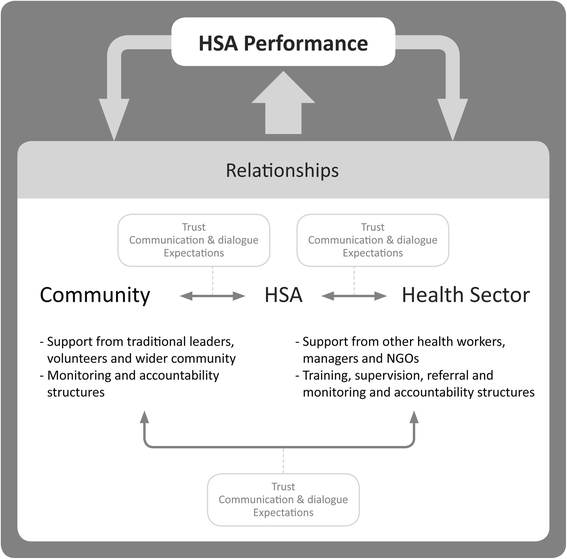Health surveillance assistants as intermediates between the community and health sector in Malawi: exploring how relationships influence performance
- PMID: 27142944
- PMCID: PMC4853867
- DOI: 10.1186/s12913-016-1402-x
Health surveillance assistants as intermediates between the community and health sector in Malawi: exploring how relationships influence performance
Abstract
Background: There is increasing global interest in how best to support the role of community health workers (CHWs) in building bridges between communities and the health sector. CHWs' intermediary position means that interpersonal relationships are an important factor shaping CHW performance. This study aimed to obtain in-depth insight into the facilitators of and barriers to interpersonal relationships between health surveillance assistants (HSAs) and actors in the community and health sector in hard-to-reach settings in two districts in Malawi, in order to inform policy and practice on optimizing HSA performance.
Methods: The study followed a qualitative design. Forty-four semi-structured interviews and 16 focus group discussions were conducted with HSAs, different community members and managers in Mchinji and Salima districts. Data were recorded, transcribed, translated, coded and thematically analysed.
Results: HSAs had relatively strong interpersonal relationships with traditional leaders and volunteers, who were generally supportive of their work. From the health sector side, HSAs linked to health professionals and managers, but found them less supportive. Accountability structures at the community level were not well-established and those within the health sector were executed irregularly. Mistrust from the community, volunteers or HSAs regarding incentives and expectations that could not be met by "higher levels" undermined support structures and led to demotivation and hampered performance. Supervision and training were sometimes a source of mistrust and demotivation for HSAs, because of the perceived disinterest of supervisors, uncoordinated supervision and favouritism in selection of training participants. Rural HSAs were seen as more disadvantaged than HSAs in urban areas.
Conclusions: HSAs' intermediary position necessitates trusting relationships between them and all actors within the community and the health sector. There is a need to improve support and accountability structures that facilitate communication and dialogue, increase trust and manage expectations and thereby improve interpersonal relationships between HSAs and actors in the community and health sector. This would maximize the value of HSAs' unique intermediary position and support them to deliver equitable health services. This is particularly important in rural areas, where HSAs often constitute the only point of contact with health services, yet report limited support from the health system.
Keywords: Community health workers; Health surveillance assistants; Malawi; Performance; Relationships; Trust.
Figures
Similar articles
-
A qualitative assessment of health extension workers' relationships with the community and health sector in Ethiopia: opportunities for enhancing maternal health performance.Hum Resour Health. 2015 Sep 30;13:80. doi: 10.1186/s12960-015-0077-4. Hum Resour Health. 2015. PMID: 26423049 Free PMC article.
-
Enabling and hindering factors of health surveillance assistants' roles in the provision of contraceptive services in Mangochi, Malawi.Reprod Health. 2020 Apr 20;17(1):57. doi: 10.1186/s12978-020-0906-3. Reprod Health. 2020. PMID: 32312279 Free PMC article.
-
Motivation of health surveillance assistants in Malawi: A qualitative study.Malawi Med J. 2016 Jun;28(2):37-42. doi: 10.4314/mmj.v28i2.2. Malawi Med J. 2016. PMID: 27895826 Free PMC article.
-
Performance of community health workers: situating their intermediary position within complex adaptive health systems.Hum Resour Health. 2017 Sep 2;15(1):59. doi: 10.1186/s12960-017-0234-z. Hum Resour Health. 2017. PMID: 28865471 Free PMC article. Review.
-
Sources of community health worker motivation: a qualitative study in Morogoro Region, Tanzania.Hum Resour Health. 2013 Oct 10;11:52. doi: 10.1186/1478-4491-11-52. Hum Resour Health. 2013. PMID: 24112292 Free PMC article. Review.
Cited by
-
The community health worker as service extender, cultural broker and social change agent: a critical interpretive synthesis of roles, intent and accountability.BMJ Glob Health. 2020 Jun;5(6):e002296. doi: 10.1136/bmjgh-2020-002296. BMJ Glob Health. 2020. PMID: 32546585 Free PMC article.
-
"Most of what they do, we cannot do!" How lay health workers respond to barriers to uptake and retention in HIV care among pregnant and breastfeeding mothers in Malawi.BMJ Glob Health. 2020 Jun;5(6):e002220. doi: 10.1136/bmjgh-2019-002220. BMJ Glob Health. 2020. PMID: 32561513 Free PMC article.
-
The Extent of Integration of Community Health Worker Programs Into National Health Systems: Case Study of Botswana.Inquiry. 2022 Jan-Dec;59:469580221093170. doi: 10.1177/00469580221093170. Inquiry. 2022. PMID: 35946905 Free PMC article.
-
Adapting group care to the postpartum period using a human-centered design approach in Malawi.BMC Health Serv Res. 2023 Oct 14;23(1):1098. doi: 10.1186/s12913-023-10036-2. BMC Health Serv Res. 2023. PMID: 37838673 Free PMC article.
-
Post-discharge malaria chemoprevention (PMC) in Malawi: caregivers` acceptance and preferences with regard to delivery methods.BMC Health Serv Res. 2018 Jul 11;18(1):544. doi: 10.1186/s12913-018-3327-z. BMC Health Serv Res. 2018. PMID: 29996833 Free PMC article. Clinical Trial.
References
-
- Nyirenda L, Namakhoma I, Chikaphupha K, Kok MC, Theobald S. Report on the context analysis of close-to-community providers in Malawi. Lilongwe: REACH Trust; 2014.
-
- Smith S, Deveridge A, Berman J, Negin J, Mwambene N, Chingaipe E, Ritchie LMP, Martiniuk A. Task-shifting and prioritization: a situational analysis examining the role and experiences of community health workers in Malawi. Hum Resour Health. 2014;12(1):24. doi: 10.1186/1478-4491-12-24. - DOI - PMC - PubMed
-
- Personal communication with the Chief Environmental Health Officer of the Ministry of Health, 2015.
Publication types
MeSH terms
LinkOut - more resources
Full Text Sources
Other Literature Sources
Miscellaneous


